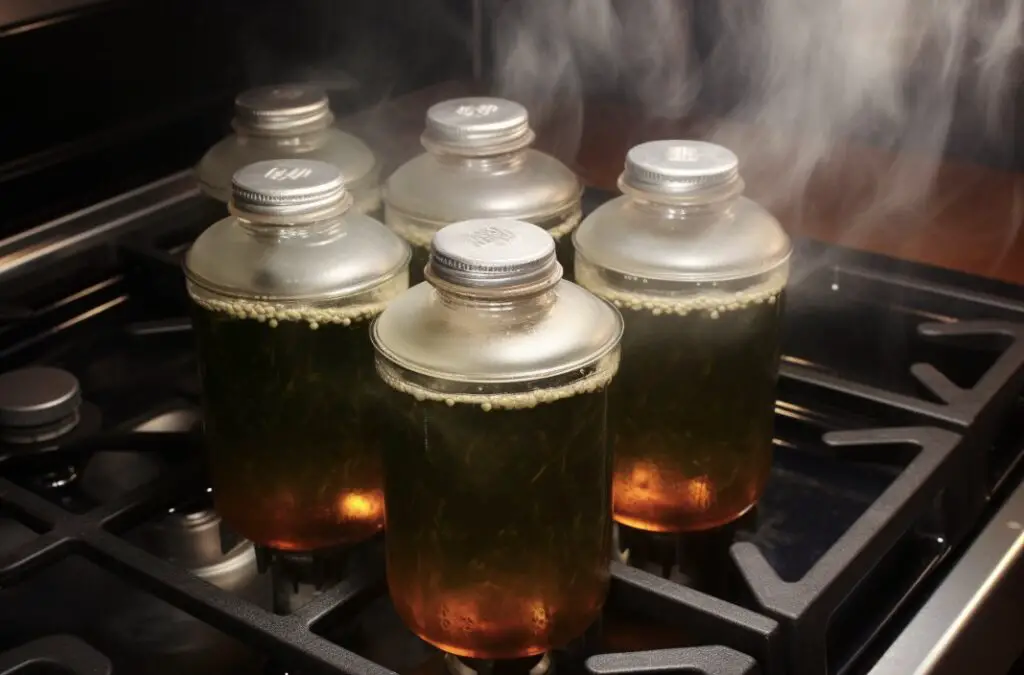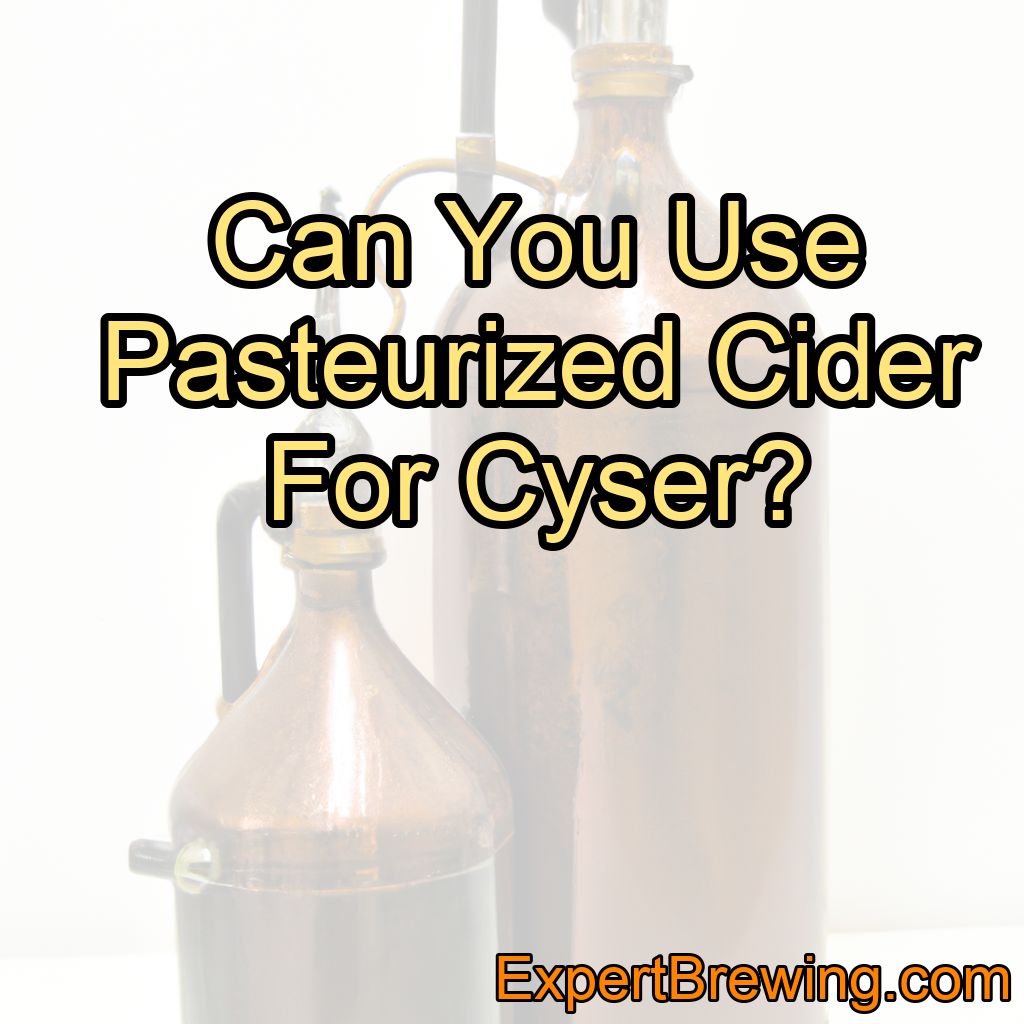As a brewer, I often get asked about the different types of beverages that can be made at home. One question that frequently pops up is: Can you use pasteurized cider for cyser?
The short answer is, yes, you can. But the process and the outcome might differ compared to using fresh, unpasteurized cider.
For those not familiar with cyser, it’s a type of mead made by fermenting honey with apple cider.
In this blog post, I will share my experiences and tips on how to use pasteurized cider to brew cyser. Let’s dive into it!
How does pasteurization affect the flavour of apple juice?
Pasteurization is the process of heating a liquid to kill microorganisms that can cause disease or spoilage.
The process is used for many types of foods and beverages, including apple juice, to increase its shelf life and ensure its safety for consumption.
The effect of pasteurization on the flavor of apple juice can be nuanced, but here are some general observations:
- Change in Freshness: The most immediate difference that can be noted is the loss of that fresh-squeezed taste. Unpasteurized juice tastes more like freshly crushed apples, while pasteurized juice can lose some of its fresh, crisp character.
- Loss of Volatile Compounds: Apple juice contains many volatile compounds that contribute to its aroma and flavor. Heating during pasteurization can cause some of these volatile compounds to evaporate or break down, potentially altering the aroma and subtle flavor nuances of the juice.
- Maillard Reaction: When apple juice is subjected to higher temperatures, as is the case with certain pasteurization methods, the sugars in the juice can react with amino acids, leading to subtle caramel or cooked flavors. This is due to the Maillard reaction, the same chemical reaction responsible for browning food when it’s cooked.
- Change in Texture: Although the main concern is flavor, pasteurization can also slightly change the texture or mouthfeel of apple juice. The heating process can cause pectin (a natural component in apples) to break down, potentially leading to a less viscous or “full-bodied” juice.
- Reduction in Enzymatic Activity: Enzymes present in apple juice, such as polyphenol oxidase, can cause browning and change the flavor profile over time. Pasteurization deactivates these enzymes, which can help maintain a consistent flavor over the shelf life of the juice.
- Reduction in Microbial Activity: The main purpose of pasteurization is to kill harmful microorganisms. But along with harmful bacteria, beneficial microorganisms that can contribute to flavor (similar to how they do in fermented products) are also destroyed. This ensures the juice has a consistent flavor profile, free from fermentative or souring changes that microbes can introduce.
It’s worth noting that the degree to which pasteurization affects flavor can vary based on the specific pasteurization method used (e.g., flash pasteurization vs. batch pasteurization), the variety of apple, and the specific conditions of the pasteurization process.
Many artisanal producers and cider makers opt for non-thermal methods, like ultraviolet (UV) treatment, or add preservatives to unpasteurized juice to retain the fresh apple flavor while ensuring safety.

However, from a public health standpoint, especially for commercial distribution, pasteurization is widely recommended to prevent foodborne illnesses from pathogens like E. coli or Cryptosporidium that can be present in raw juice.
What is Cyser?
A Brief History of Cyser
Cyser is an ancient drink that has been enjoyed for centuries. It’s a form of mead, a fermented beverage made from honey. The unique twist with cyser is the addition of apple cider, which adds a delightful fruity flavor to the drink. Cyser is thought to have originated in the British Isles, where apples are plentiful and honey was historically a common sweetener.
The Brewing Process
Brewing cyser involves combining honey, apple cider, and yeast, then allowing the mixture to ferment.
The yeast feeds on the sugars in the honey and cider, producing alcohol and carbon dioxide. The process can take anywhere from a few weeks to several months, depending on the specific recipe and desired alcohol content.
The key to a successful brew is patience – rushing the fermentation process can result in an inferior product.
Pasteurized vs Unpasteurized Cider
Apple cider is a beloved beverage in many cultures and comes in two primary variants: pasteurized and unpasteurized.
Understanding the differences between the two can help consumers make informed decisions based on taste preferences and health considerations.
Pasteurized Cider
Pasteurization is a heat treatment that eradicates bacteria and other microorganisms. This process ensures the cider is free from potentially harmful pathogens, providing a safer drink for consumers.
Pros:
- Safety: Pasteurized cider has a reduced risk of containing harmful bacteria, making it safer for all age groups.
- Shelf Life: Due to the absence of active microorganisms, pasteurized cider typically has a longer shelf life.
- Consistency: The flavor and quality of pasteurized cider tend to be more consistent from batch to batch.
Cons:
- Flavor: Some argue that the pasteurization process can mute or alter the cider’s natural flavors.
- Nutrients: Pasteurization might reduce some of the natural nutrients present in the cider.
Unpasteurized Cider
Unpasteurized or raw cider retains all the natural yeasts and bacteria from the apples. This results in a more natural taste, but also carries potential health risks.
Pros:
- Robust Flavor: Unpasteurized cider is often described as having a deeper, more complex taste due to the presence of natural yeasts and bacteria.
- Natural: Contains all the natural elements of the apple, which might provide a richer nutritional profile.
Cons:
- Safety Concerns: Raw cider can pose health risks, especially to individuals with compromised immune systems, the elderly, and children, due to the potential presence of harmful pathogens.
- Shorter Shelf Life: Without pasteurization, unpasteurized cider might ferment or spoil more quickly.
In summary, while pasteurized cider provides a safer and more consistent beverage experience, unpasteurized cider offers a more authentic and robust flavor. It’s essential for consumers to weigh the pros and cons to determine which option best suits their needs and preferences.
Using Pasteurized Cider for Cyser
While many brewers prefer to use unpasteurized cider for cyser due to its fuller flavor, pasteurized cider can certainly be used instead. The process is virtually the same, but there are a few things to keep in mind.

Firstly, pasteurized cider will require the addition of yeast. This is because the pasteurization process kills off most of the natural yeasts present in the cider. Adding more yeast ensures that there will be enough to ferment the sugars in the honey and cider.
Secondly, it’s important to check the label of the pasteurized cider you’re using. Some brands add preservatives to their cider, which can inhibit fermentation. Look for a brand that only lists apples (and possibly ascorbic acid, a form of vitamin C) in the ingredients.
Tips for Brewing with Pasteurized Cider
Choosing the Right Honey
The honey you choose for your cyser can greatly affect the final flavor. A milder honey, like clover or acacia, will allow the apple flavor to shine through. A darker, more robust honey, like buckwheat or chestnut, will add depth and complexity to the brew.
Fermentation Time
As I mentioned earlier, patience is key when brewing any type of mead, including cyser. The fermentation process can take anywhere from a few weeks to several months. The longer the brew is allowed to ferment, the more complex the flavor will become.
Conclusion
So, there you have it! You can indeed use pasteurized cider for making cyser. While it may require a bit of extra yeast and careful selection to avoid preservatives, the process is essentially the same as brewing with unpasteurized cider. And the result is a delicious, fruity mead that’s perfect for sipping on a cool autumn evening.
Here are some key takeaways from this blog post:
1. Cyser is a type of mead made by fermenting honey with apple cider.
2. Cyser originated in the British Isles.
3. The brewing process for cyser involves combining honey, cider, and yeast and allowing the mixture to ferment.
4. Pasteurization kills bacteria and other microorganisms in cider, making it safer for consumption.
5. The main difference between pasteurized and unpasteurized cider is the flavor.
6. Pasteurized cider can be used to brew cyser, but it might require additional yeast.
7. Some brands of pasteurized cider contain preservatives, which can inhibit fermentation.
8. The type of honey used in cyser can greatly affect the final flavor.
9. Fermentation time for cyser can range from a few weeks to several months.
10. Patience is key when brewing cyser.
In my personal brewing experience, I’ve found that using pasteurized cider can yield a delicious cyser, especially when you carefully select your honey and allow ample time for fermentation. So, why not give it a try? Happy brewing!
FAQs
Can you drink pasteurized apple cider?
Yes, you can drink pasteurized apple cider.
Can you make hard cider with pasteurized juice?
Yes, you can make hard cider with pasteurized juice. The process involves fermenting the sugars in the juice with yeast, which converts the sugars into alcohol. Pasteurized juice can be used as a base for making hard cider, as long as it does not contain any preservatives that might hinder the fermentation process.
Does hard apple cider need to be pasteurized?
Hard apple cider does not necessarily need to be pasteurized, but it can be beneficial. Pasteurization helps to kill any harmful bacteria or yeast present in the cider, ensuring its safety and extending its shelf life. However, some cider makers prefer to use alternative methods such as filtration or cold stabilization to achieve similar results. Ultimately, the decision to pasteurize hard apple cider depends on the preferences and production methods of the cider maker.
How long is pasteurized apple cider good for?
Pasteurized apple cider is typically good for about 7 to 10 days when stored in the refrigerator.
Can you use unpasteurized cider for hard cider?
Yes, you can use unpasteurized cider to make hard cider.
Can I use pasteurized cider for hard cider?
Yes, you can use pasteurized cider to make hard cider. Pasteurized cider is a suitable option for fermenting into hard cider as it does not contain any preservatives that could hinder the fermentation process.




